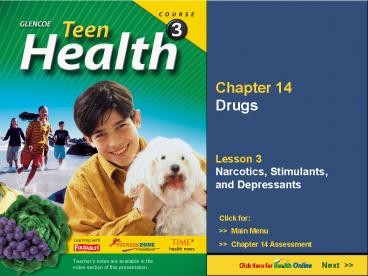Teen Health Course 3 PowerPoint PPT Presentation
1 / 27
Title: Teen Health Course 3
1
Chapter 14 Drugs
Lesson 3 Narcotics, Stimulants,and Depressants
Click for
gtgt Main Menu
gtgt Chapter 14 Assessment
Teachers notes are available in the notes
section of this presentation.
Next gtgt
2
Specific drugs that are obtainable only by
prescription and are used to relieve pain
- narcotics
Liquid from the poppy plant containing substances
that numb the body
- opium
A feeling of well-being or elation
- euphoria
Symptoms that occur after chronic use of a drug
is reduced or stopped
- withdrawalsymptoms
3
Drugs that speed up activity in the human brain
and spinal cord
- stimulants
A drug that stimulates the central nervous system
- amphetamine
When a drug is taken repeatedly and at
increasingly high doses
- binge
- CNSdepressants
Substances that slow down normal brain function
4
- In this lesson, you will learn to
- name the most commonly abused narcotics.
- describe the effects that narcotics can have on a
users health. - identify specific stimulants and CNS depressants.
- name the health risks linked to stimulants and
CNS depressant abuse.
5
Identifying Cause-and-Effect Make a two-column
chart. In the first column, write the names of
drugs presented in this lesson. In the second,
list the effects of these drugs.
6
What Are Narcotics?
- Historically, narcotics were made from opium.
narcotics Specific drugs that are obtainable
only by prescription and are used to relieve pain
opium A liquid from the poppy plant containing
substances that numb the body
7
Narcotics and Addiction
- Narcotics produce euphoria because they affect
the areas of the brain that perceive pleasure.
euphoria A feeling of well-being or elation
8
Narcotics and Addiction
- Withdrawal symptoms can be unbearable.
withdrawal symptoms Symptoms that occur after
chronic use of a drug is reduced or stopped
9
Heroin
Characteristics of Heroin
Made of morphine, a narcotic
Most often inhaled or injected intravenously
Users develop a psychological and physical dependence
Tolerance leads to a need for ever-increasing doses
Quitting is very difficult
Quitting results in painful withdrawal symptoms
10
OxyContin
Characteristics of OxyContin
Available through a doctors prescription
Controls severe pain in patients with cancer, back pain, or arthritis
Abuse leads to tolerance, which leads to physical addiction
Withdrawal symptoms are similar to other narcotics
11
What Are Stimulants?
- Stimulants cause the heart to beat faster and
cause blood pressure and metabolism to rise.
stimulants Drugs that speed up activity in the
human brain and spinal cord
Some stimulants are so mild that people may not
realize they are ingesting a drug.
12
Amphetamines
- Amphetamines are highly addictive.
amphetamine A drug that stimulates the central
nervous system
Using large amounts of amphetamines can result in
aggressive behavior, extreme weight loss, and
loss of physical strength.
13
Cocaine
Characteristics of Cocaine
Illegal stimulant derived from the coca plant
Sold as a fine white powder
Often mixed with water and injected into the body intravenously
Can also be smoked or snorted up the nose
One of the most addictive drugs on the street today
14
Cocaine
- During a cocaine binge, the possible consequences
are very dangerous.
binge When a drug is taken repeatedly and at
increasingly high doses
15
Crack
- Crack is created when cocaine is heated and
processed with baking soda and water. - Crack is extremely addictive and dangerous.
16
Methamphetamine
Characteristics of Methamphetamine
Highly addictive stimulant drug, affects the central nervous system
Becoming an epidemic in the United States
Produced in illegal laboratories
Effects are similar to cocaine
Also known as meth
17
Methamphetamine
Effects of Methamphetamine
Initial feelings of confidence and energy
Tendency on the part of users to binge
Users may go days without food or sleep
Users find it impossible to feel any pleasure without the drug
Unpredictable behavior
18
Effects of Stimulants
Substance Harmful Effects
Amphetamine Uneven heartbeat, rise in blood pressure, physical collapse, stroke, heart attack, and death
Methamphetamine Memory loss, damage to heart and nervous system, seizures, and death
Cocaine Damage to nose lining and liver heart attack, seizures, stroke, and death
Crack Damage to lungs if smoked, seizures, heart attack, and death
19
What Are Central Nervous System (CNS) Depressants?
- CNS depressants are sometimes called sedatives or
tranquilizers.
CNS depressants Substances that slow down
normal brain function
Physicians can prescribe some CNS depressants for
relief of sleeplessness, anxiety, or tension.
20
What Are Central Nervous System (CNS) Depressants?
Two Commonly Prescribed CNS Depressants
Barbiturates
Prescribed for the treatment of anxiety or
tension, or for people with sleep disorders.
Benzodiazepines
Prescribed for patients with more serious anxiety
and panic attacks.
21
Effects of Depressants
Substance Harmful Effects
Tranquilizer Anxiety reduced coordination and attention span. Withdrawal can cause tremors and lead to coma or death.
Barbiturate Causes mood changes and excessive sleep. Can lead to coma.
Hypnotic Impaired coordination and judgment. High doses may cause internal bleeding, coma, or death.
22
Lesson 3 Review
What I Learned
Vocabulary Define narcotics.
23
Lesson 3 Review
What I Learned
List Name two commonly abused narcotics.
24
Lesson 3 Review
What I Learned
Give Examples Give three examples of harmful
effects that can result from abusing stimulants.
25
Lesson 3 Review
Thinking Critically
Evaluate Explain the physical and psychological
effects that can cause a person to become
addicted to heroin.
26
Lesson 3 Review
Thinking Critically
Analyze What are some of the high-risk behavior
that could result from the abuse of narcotics?
27
End of
Chapter 14 Drugs
Lesson 3 Narcotics, Stimulants,and Depressants
Click for
gtgt Main Menu
gtgt Chapter 14 Assessment

